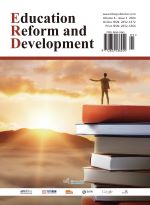Abstract
Inorganic and analytical chemistry is a compulsory basic course for students majoring in biology. The goal of this course is to provide them with the necessary chemical knowledge and experimental skills and to lay the foundation for the subsequent professional courses. This study explores the teaching model reform of inorganic and analytical chemistry teaching for non-chemistry majors according to the current situation, hoping to explore a suitable course teaching model for biology majors by optimizing teaching content, stimulating students’ interest, and improving teaching methods.
References
Zuo TT, 2023, Reform and Exploration of Chemistry Course Teaching for Biology Majors: Taking Inorganic and Analytical Chemistry Course as an Example. Modern Salt Chemical Engineering, 50(3): 114–115.
Wang YZ, Liu HY, Cui N, 2018, A Teaching Model of Inorganic and Analytical Chemistry Theory Course Suitable for Freshmen. Guangzhou Chemical Industry, 46(24): 3.
Wang DW, Bao HB, Xiao C, et al., 2023, Exploration of Systematic Teaching Reform of non-Chemistry Major College Chemistry Curriculum. Chemical Design Communication, 49(9): 103–105.
Dong YQ, Jin GL, Sun ZJ, et al., 2020, Reform of the Teaching Model of Grassland Science under the New Situation. Grassland Science, 2020(S1): 54–56.
Qi FF, 2022, Research on Teaching Reform of Inorganic and Analytical Chemistry Course for Biology Major. Guangzhou Chemical Industry, 50(15): 252–253.
Liu DM, 2022, Application of Problem String Teaching in Inorganic and Analytical Chemistry. Guangdong Chemical Industry, 49(15): 248–250.
Zhu YA, 2023, Exploration of Primary school Mathematics Teaching Practice towards Deep Learning. Examination Weekly, 2023(47): 84–87.
Li XY, Zhang HY, Meng LP, et al., 2022, Research and Practice of Online and Offline Mixed Teaching Model for Computational Chemistry Experiment. University Chemistry, 37(12): 68–74.
Hu ZR, Yu HX, Hui D, 2021, Application of Concept Map in Senior High School Chemistry Review Course. Anhui Chemical Industry, 47(6): 223–225 + 228.
Liu CNX, 2013, An Effective Way to Mobilize Students’ Enthusiasm: Some Experience in Mathematics Teaching. Educational Innovation, 2013(9): 33–34.
Gao SM, Zhao GH, Zheng LL, et al., 2022, Application of Mind Map + Micro-Lesson in the Teaching of Environmental Chemistry. Guangzhou Chemical Industry, 50(16): 211–213.
Liu BQ, Zhang JX, Hu J, et al., 2023, Concept and Path of Ecological Development of Education Evaluation Service under the Background of Digital Transformation: Based on the Perspective of Education Evaluation Reform and Education Informatization Industry Data Analysis. China Educational Informatization, 29(5): 41–52.
Wu HM, 2020, Smart Classroom Strategies for Integration and Innovation of Information Technology and Teaching in the Era of “Internet +”. Baike Forum Electronic Magazine, 2020(10): 952.
Dong YQ, Sun ZJ, Yang HL, et al., 2022, Reform of Theoretical Teaching and Practical Teaching Mode in Grassland Cultivation Classroom under the New Situation. Theoretical Research and Practice of Innovation and Entrepreneurship, 2022(11): 154–157.
Qi YJ, Zheng XJ, Mo KF, 2019, How to Stimulate, Maintain and Strengthen Learning Motivation in Micro-lessons. Journal of Guangxi Vocational and Technical College, 12(4): 87–90.
